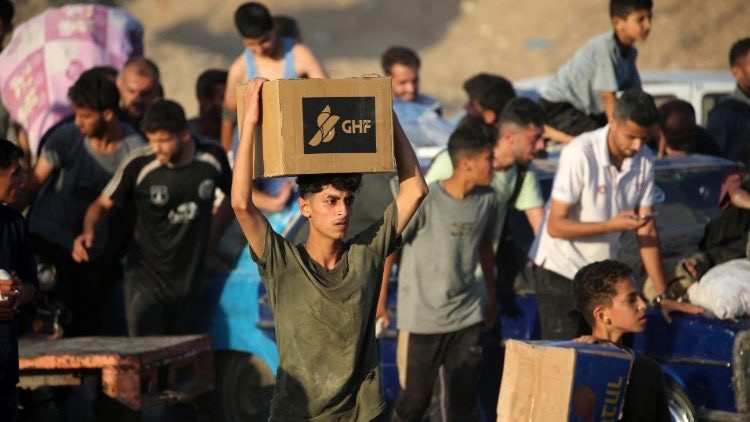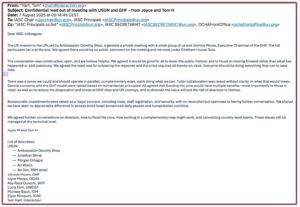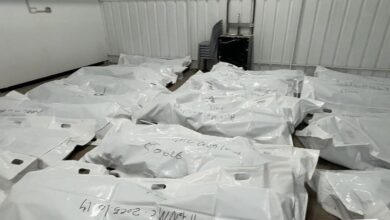Leaked Email Reveals UN and Major NGO Officials Met with GHF, Calling to Work “in Parallel”

New York (Quds News Network)- A leaked email revealed that senior international aid officials, including from the United Nations, met on Wednesday with the chairman of the controversial US- and Israeli-backed Gaza Humanitarian Foundation (GHF) to discuss collaboration and “lower the public rhetoric”, amid reports of Israeli killings of aid seekers at GHF aid sites, which have been condemned as “mass death traps.”
The New Humanitarian obtained a read-out of the confidential meeting emailed on 7 August to the Inter-Agency Standing Committee (IASC) – the highest-level coordination forum in the international humanitarian system, composed of UN agencies and major NGOs.
It was co-signed by Joyce Msuya, the second-most senior official at the UN’s emergency aid coordination body, OCHA.
The meeting was organised by the US ambassador to the UN, Dorothy Shea, and was attended by GHF executive chairman Johnnie Moore, alongside several US diplomats and officials from the World Food Programme, UNICEF, the UN’s migration agency (IOM), OCHA, the International Committee of the Red Cross (ICRC), and InterAction.
They agreed to develop a “fuller collaboration”, to continue discussions, and to “lower the public rhetoric”, likely a reference to reducing the criticism GHF has faced from aid agencies since it began operations.
The groups haven’t yet commented on the leaked email.
According to Axios, citing a US official and two other sources with direct knowledge, the meeting took place on Wednesday, 6 August, at the US mission to the UN in New York. It added that no phones were allowed in the meeting, and it was held under “Chatham House Rules”, meaning nothing in the meeting could be attributed to its participants.
The meeting and the willingness to pursue cooperation marks a significant shift in position for aid groups and the UN.
After more than 80 days of total blockade, starvation, and growing international outrage, limited aid has allegedly been distributed by the Gaza Humanitarian Foundation, a scandal-plagued organization backed by the US and Israel, created to bypass the UN’s established aid delivery infrastructure in the Gaza Strip.
Most humanitarian organisations, including the UN, have distanced themselves from GHF, arguing that the group violates humanitarian principles by restricting aid to south and central Gaza, requiring Palestinians to walk long distances to collect aid, and only providing limited aid, among other critiques. They have also said the model would increase forced displacement in Gaza.
Moreover, mass killings of aid seekers near and at GHF aid sites have become a grim daily reality amid chaotic scenes, as desperate Palestinians are given only a narrow window to rush for food and are targeted by Israeli forces and American mercenaries. Testimonies and evidence from US mercenaries working with GHF, as well as from Gaza civilians, reveal that aid seekers are being directly and deliberately targeted, despite posing no threat.
Palestinians in Gaza and the UN described these sites as “mass death traps” and “slaughterhouses”.
The meeting came just days after UN experts called for the dismantling of the GHF, describing it as a “disturbing example” of humanitarian aid being exploited for military and geopolitical agendas in violation of international law, while rights groups have labelled Israeli killings at distribution sites as war crimes.
The meeting, however, was described in the email as “constructive” and “open”, with participants expressing a sense that “we could and should operate in parallel, complementary ways, each doing what we can”.
Tom Fletcher, the UN relief chief who heads OCHA, described GHF in May as a “cynical sideshow, a deliberate distraction, a fig leaf for further violence and displacement”. Msuya, who attended the meeting and co-signed the read-out, is Fletcher’s deputy at OCHA.
The other co-signatory was Tom Hart, president of InterAction, which describes itself as the largest US-based alliance of international NGOs. Several member organisations of InterAction signed a joint statement on 30 June and 1 July calling for immediate action to end what they described as the “deadly Israeli distribution scheme”.





